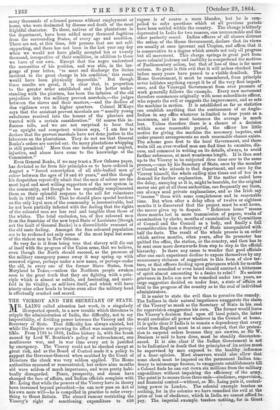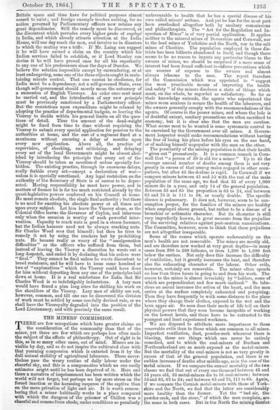many thousands of coloured persons without employment or rupees is
of course a mere blunder, but he is corn- borne, who were decimated by disease and death of the most pelled to refer questions which tit all previous periods -• frightful character. To these, natives of the plantations in have been settled within the country. The change is bitterly the department, have been added many thousand fugitives deprecated in India for two reasons, one unreasonable and the from the surrounding States, of every age and condition. other perfectly sound. Indian officers of all classes distrust There are not, at this time, 500 persons that are not self- the action. of the Home Government, declare that its views. supporting, and there has not been in the last year any day are usually at once ignorant and Utopian, and affirm that it when we would not- have gladly accepted ten or twenty is conservative to a degree which arrests not only all progress- thousand, irrespective of their condition, in addition to those but all movement. This charge springs in great part from. we have of our own. Except that the negro understood mere colonial jealousy and inability to comprehend the motives. the necessities of his position, and was able, in the lan- of Parliamentary action, but that of loss of time is far more- guage of your letter, ' to meet and discharge the duties serious. So great is this evil that it will unless checked lead incident to the great change in his condition,' this result before many years have passed to a visible deadlock. The- would have been physically impossible." But though Home Government, it must be remembered, from principle these results are great, it is clear that, in proportion never initiates anything except it be of the very first import- to the greater order established and the better under- ane,e, and the Viceregal Government from over pressure of standing with the planters, has been the infusion of the old work generally follows the example. Every new movement prejudices into the military provost marshals,—the judges therefore commences originally with some subordinate officer, between the slaves and their masters,—and the decline of who reports the evil or suggests the improvement, and so sets. due vigilance even in higher quarters. Colonel M'liaye the machine in motion. It is established as far as statistics- says that the assistant-provost marshals are " usually young can establish anything that the continuance of an A.nglo- subalterns received into the houses of the planters and Indian in any office whatever is limited to four years as a. treated with a certain consideration." Of course this in- maximum, and in most instances the average is much fluence tells, and we are not surprised to hear that less. Unless therefore there is a chance of a decision " an upright and competent witness says, I am free to within some reasonable period, the officer has little- declare that the provost marshals have not done justice to the motive for giving the machine the necessary impetus, and. labourers on the plantations. They do not see that General under present arrangements no such reasonable chance exists. Banks's orders are carried out. On many plantations whipping The scheme goes first to the local Government, and there is still permitted.' More than one instance of great neglect, waits till an over-worked man can find time to examine, dis- injustice, and abuse have come to the knowledge of the cuss, and comment in writing on its details, always, to avoid Commission." further references, at most wearisome length. It is then sent. Even General Banks, if we may trust.a New Orleans paper, up.to the Viceroy to be subjected three times over to the same has deviated so far from fair principles as to have ordered in process,—once by his Secretary of State, once by the member August a "forced conscription of all able-bodied men of of Council who attends to that department, and once by the colour between the ages of 18 and 40 years," and this though Viceroy himself, the whole ending nine times out of ten in a his despatches repeatedly admit that the men of colour are the demand for further explanation. If the matter ended here- most loyal and most willing supporters of the new system in the delay, annoying as it is, might be bearable, for the original the community, and though he has repeatedly complimented mover can get at all these authorities, can frequently see them, them on their splendid response to the call for volunteers can always send private explanations, and as the Irish say- both in 1862 and 1863. That he should place special burdens " insense " them with some completeness and in reasonable on the only loyal men of the community is inconceivable, had time. But when after a delay often of twelve or eighteen he not been partially infected with the feeling that the rights months it is discovered that the project must be sent home, of the coloured men are less real and tangible than those of the mover gives up in despair. "Reference home" means the whites. The total exclusion, too, of free coloured men three months lost in mere transmission of papers, weeks of from the franchise of the new loyal State of Louisiana (though examination by clerks, months of examination by Committees not the fault of General Banks) is a discreditable remnant of of Council and the Council as a body, and finally a full the old caste feeling. Amongst the free coloured population reconsideration from a Secretary of State unacquainted with are to be reckoned not only some of the most loyal but some half the facts. The result of the whole process is an order- It is easier to state the evil than to perceive the remedy. Britain space and time have for political purposes almost lunfavourable to health that he has a special disease of his ceased to exist ; and foreign example teaches nothing, for no nation governed by Parliamentary officers now retains any great dependencies. Still the remedy must be discovered, or the discontent which pervades every higher grade of employi in India, and which already attracts attention at the India House, will one day reach the men, and involve us in disasters to which the mutiny was a trifle. If Mr. Laing can suggest it he will have earned a claim on the country which his Indian services failed to establish, or if Lord Stanley can devise it he will have proved once for all his superiority to any one of his predecessors since the days of Dundas. We believe the solution impossible except by surrendering, or at least endangering, some one of the three objects sought in main- taining minute control. That one cannot be obedience, for India must be a dependency, not a self-governed State, even though self-government should merely mean the autocracy of a succession of English Viceroys. An order once sent must be carried out, and the introduction of any new principle must be previously sanctioned by a Parliamentary officer. But the restrictions upon expenditure might be relaxed by adopting the practice of departmental budgets, so leaving the Viceroy to decide within his general limits on all the ques- tions of detail. Thus the amount of the dead-weight might be fixed from time to time without requiring the Viceroy to submit every special application for pension to the authorities at home, and the cost of a regiment fixed at a maximum without ensuring a delay of months upon every new application. Above all, the practice of supervision, of checking, and criticizing, and delaying every act of the local Governments might be almost abol- ished by introducing the principle that every act of the Viceroy should be taken as sanctioned unless specially for- bidden. The existing practice, through its enormous delays, really forbids every act—except a declaration of war— unless it is specially sanctioned. Any legal restriction on the authority of the Secretary of State is of course to be depre- cated. Having responsibility he must have power, and in matters of finance he is far too much restricted already by the quasi-legislative powers conferred on his Council at home. He must remain absolute, the single final authority ; but there is no need for exerting his absolute power at all times and upon every subject. Let him leave the Viceroy alone, as the Colonial Office leaves the Governor of Ceylon, and intervene only when the occasion is worthy of such powerful inter- vention. Capacity to crack nuts is good in a steam-hammer, but the Indian hammer need not be always cracking nuts. Sir Charles Wood sees that himself; but then he tries to remedy it not by using the crackers but by prohibiting nuts. He became really as weary of the "amalgamation difficulties" as the officers who suffered front them, but instead of leaving the Viceroy a discretion he wrote out a long despatch, and ended it by declaring that his orders were "final." Theycannot be final unless he wants discontent to breed resistance, and he will have to issue some hundred or two of " explanations " which the Viceroy could have done for him without departing from any one of the principles laid down at home. It is a real misfortune for India that Sir Charles Wood is so indefatigably industrious. A lazy man would have found a plan long since for shifting his work on the shoulders of the Viceroy. Lazy men of ability are not, however, common, and till one can be discovered the division of work must be settled by some carefully devised rule, or we shall have the Viceroyalty degraded into the position of the Lord-Lieutenancy, and with precisely the same result.



































 Previous page
Previous page